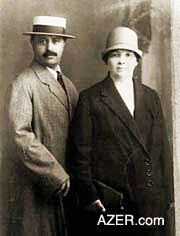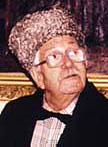|

Winter 1997 (5.4)
Leyli and Majnun
- 90th Jubilee
The Opera
that Shaped the Music of a Nation
Music
Index - HAJIBEYOV.com
by Ramazan Khalilov
  On January 25, 1908, it will be 90 years
since the premiere of Uzeyir Hajibeyov's opera, "Leyli and
Majnun." Azerbaijanis take pride that this was the first
opera, not only in Azerbaijan, but in the entire Muslim world.
Furthermore, this was the first work by an Azerbaijani composer
to incorporate traditional Azerbaijani mugam (modal) improvisations
into the format of a European opera. On January 25, 1908, it will be 90 years
since the premiere of Uzeyir Hajibeyov's opera, "Leyli and
Majnun." Azerbaijanis take pride that this was the first
opera, not only in Azerbaijan, but in the entire Muslim world.
Furthermore, this was the first work by an Azerbaijani composer
to incorporate traditional Azerbaijani mugam (modal) improvisations
into the format of a European opera.
"Leyli and Majnun" is a tragic love story based on
the 16th century poem of the same name by the Azerbaijani poet
Fuzuli. The story has its roots in a feudal Arabic legend.
Only one person in Baku is alive today who witnessed that historical
presentation in 1908. Ramazan Khalilov was seven years old at
the time. Here he reminisces about that eventful night that took
place almost a century ago.
Photo: Uzeyir Hajibeyov and
his wife Maleyka in 1926.
Ninety Years Ago
I was
seven years old when the opera "Leyli and Majnun" was
performed for the first time in Baku. I'm Chechen and was born
in Grozny in 1900. My relation with Uzeyir
Hajibeyov began through friendship,
but later on, he married my aunt Malika Teregulova, my mom's
younger sister.
My two uncles, Ali and his older brother Hanafi Teregulov, had
become good friends with Uzeyir when they studied together in
Gory Seminary in Tbilisi [Georgia] at the turn of the century.
Both of them participated in this opera, and that's how I got
involved. Ali directed the orchestra and played violin. Hanafi
led the choir and played the role of Nofar, the military leader,
who protected Majnun. Sometimes they would take me along to rehearsals.
Of course, I was so young at the time that I didn't fully realize
the importance of what was happening. Uzeyir bey (that's the
polite term by which we used to call him) had promised that if
I worked hard at school, I could come to the opening performance
at the Taghiyev Theater. This theater, the first ever built in
Baku, was sponsored by the oil baron Zeyn-al-abdin Taghiyev and
built in 1880. It had an orchestra pit and was designed to accommodate
both musical and dramatic works. The building was down close
to the sea on the site where the new Music Comedy Theater is
currently being built.
On the night of January 25, 1908, I remember that the theater
was full. My mother and my aunts and relatives had come from
Tbilisi for the occasion. The play was scheduled for 7 o'clock
at night. The theater was one of the few buildings enjoying electric
lights. Of course, people arrived on foot or by horse and carriage.
 |
Left: Ramazan Khalilov, 97, who saw Azerbaijan's
first opera as a 7-year-old child. He was the Director of the
Hajibeyov Memorial Home Museum until 1999 when he died. Photo:
Blair, 1995.
|
I remember having
to sit with my mother up in the women's gallery. At that time
women were not allowed to appear in public unless they were veiled.
And they weren't allowed to sit in the same assembly hall together
with men, even their own husbands. The main floor was reserved
for men. Women had to sit in reserved boxes on the second and
third levels. Curiously, there was a thin veil-like screen, something
like a fisherman's net, hanging over the gallery that made the
women invisible from the rest of the audience. Needless, to say,
it also obscured their vision of the stage.
I remember pestering my mom alot that evening. Mostly, I was
bothered by the black netting. I couldn't see the stage very
clearly, and I kept asking my mom questions about the plot. Remember,
we didn't grow up with television or radio or theater like kids
do today, and so the story unfolding on stage seemed real.
I really liked the Majnun character. It was played by Huseingulu
Sarabski. He became insane from his love for Leyla. At the final
scene Majnun comes to Leyli's grave, wearing ragged clothes.
He was so distraught and exhausted that he couldn't even recognize
his relatives. As the poem goes, even the animals shared his
grief. And then he died beside Leyli's grave.
I remember being so deeply effected by that scene that I had
wanted to cry. But my father had taught me that mountain men
don't cry. My mom tried to comfort me by telling me that it was
just a story and that I shouldn't worry-Majnun was really all
right. After the opera was over, my family hung around for awhile,
waiting for some of the performers. I saw Sarabski again. He
was really all right. Nothing was wrong with him and so I calmed
down.
Behind the Scenes
Husein
Arablinski directed the opera. Hajibeyov himself was in the orchestra
pit, playing violin that first night. Gurban Primov played tar,
accompanying the mugam singers, and Abdul Ahverdiyev conducted
the orchestra. Ahverdiyev was a famous writer and scriptwriter
from Shusha [a city in Karabakh which is now under military occupation
by Armenians]. Ahverdiyev had written a stage version of "Leyli
and Majnun" that Hajibeyov had seen ten years earlier as
a 13-year-old boy. Actually, the idea to write an opera using
Azerbaijani literary themes and musical motifs came to Hajibeyov
when he was studying at Gory Seminary in Tbilisi. It was there
that he had had the chance to see Rossini's Italian opera"Barber
from Seville."
One of the unique aspects of the performance is that Hajibeyov
used traditional Azerbaijani mugams in their original form-in
the unwritten form-within the opera. But he insisted that the
mugam singers base their text on the poetry of Fuzuli's original
poem. Many of the opera's lines were identical to the original
poetry.
Although choral singing was not an Azerbaijani tradition, Hajibeyov
created a choir to comment on the events developing in the plot,
to make it more dynamic and to emphasize the psychological state
of the characters. It was the first time a choir had been used
in Azerbaijan.
Hajibeyov viewed the opera as a success. He felt that the public
was hungry for a dramatic enactment of a classic scene with folk
music. He also credited Sarabski who was so artistic in his portrayal
of Majnun.
Hajibeyov used to talk about the difficulties they had to overcome
in staging "Leyli and Majnun." There were lots of problems-both
financial as well as creative. At that time, there was no serious
performing culture-no professional actors or singers. It wasn't
easy to find individuals who could perform the lead roles.
Actually, Hajibeyov discovered Sarabski quite by chance. Not
far from the hotel "Tabriz," where he was staying,
was a water distribution center. Hajibeyov often passed by, and
one day he realized that the young man who worked there loved
to sing. In the evenings after work, that young man, Huseingulu
Sarabski, was actively involved with dramatic groups. So Uzeyir
offered him the role of the main character, Majnun. It turned
out to be a very successful choice.
The Female Role
But
selecting someone to play Leyli, the female lead, was more difficult.
Religious authorities had complained about Muslim men singing
on stage. They were even more adamant against women. Muslim women
simply could not appear on stage. Of course, Russian women living
in Baku didn't fall under the same restrictions, but none of
them could sing mugams (traditional modal music) in the Azeri
language. So an Azerbaijani man had to be found to play Leyli's
part.
As the story goes, one day Hajibeyov, Sarabski and Arablinski
were sitting together in a "chaykhana" (tea house)
when a tall, good-looking waiter came over to their table and
brought them tea. He just happened to be singing. That's when
they decided to broach the possibility of his playing the woman's
role, Leyli. After a great deal of persuasion, he finally consented.
His name was Abdulrahim Farajev. So he dressed up as a woman
and took the female lead in the first performances of Azerbaijan's
first opera.
There were other difficulties as well that related to the inadequacy
of props and financial arrangements. Hajibeyov complained that
he had had to sell his opera for a small pittance, and the fact
that the hall was filled night after night brought him no additional
financial benefit.
But more importantly, because of the popular success of the work,
the opera not only secured a place in the annals of the cultural
history of Azerbaijan for the young 23-year-old composer, but
it also set the precedent in Azerbaijan for synthesizing eastern
and western techniques and styles in much of the composed music
that came to be written during the century that followed.
It wasn't until after the Soviets seized power in the 1920s that
women could appear in public without wearing veils. Even today
there are statues in Baku that commemorate this event.
Hajibeyov himself was very sensitive to the issue. The story
is told that even when he was four years old, he used to complain
to his mother about the veil that she had to wear. He would say,
"Mom, you're so pretty. Why do you cover your face with
that rag?"
Hajibeyov later went on to write several music comedies that
satirized this social custom, the most famous of which was "Arshin
Mal Alan" (Cloth Peddler). In his play, the protagonist,
a rich merchant, had everything he wanted in life except the
chance to choose his own bride as all the girls on the street
were fully veiled. He then decided to disguise himself as a cloth
peddler just to gain entrance inside the courtyards to see the
pretty girls and choose one as his wife.
Ramazan Khalilov,
97 (born December 27, 1900), served as Deputy Assistant when
Uzeyir Hajibeyov was the Director of Baku's Conservatory of Music.
He became the "executor of Hajibeyov's will" after
the composer died in 1948 of complications related to diabetes.
Thanks to Ramazan's enormous efforts, the Hajibeyov Memorial
Home Museum was opened in 1975. He has been its Director ever
since. Ramazan died in 1999.
Elmira Abbasova, Professor and former Director of the Music Academy,
also contributed to this article.
From
Azerbaijan
International
(5.4) Winter 1997
© Azerbaijan International 1997. All Rights Reserved.
Music
Index - HAJIBEYOV.com
Back to Index AI 5.4 (Winter
1997)
AI Home |
Magazine
Choice
| Topics
| Store
| Contact
us
|


